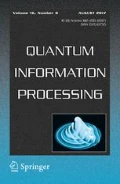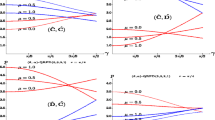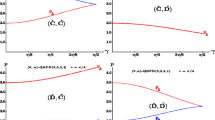Abstract
The dynamics of a spatial quantum formulation of the iterated battle of the sexes game with imperfect information is studied in this work. The game is played with variable entangling in a cellular automata manner, i.e. with local and synchronous interaction. The effect of spatial structure is assessed in fair and unfair scenarios.













Similar content being viewed by others
References
Alonso-Sanz, R.: Variable entangling in a quantum prisoner’s dilemma cellular automaton. Quantum Inf. Process. 14(1), 147–164 (2015)
Alonso-Sanz, R.: A quantum prisoner’s dilemma cellular automaton. Proc. R. Soc. A 470, 20130793 (2014)
Alonso-Sanz, R.: Variable entangling in a quantum battle of the sexes cellular automaton. LNCS 8751, pp. 125–135 (2014)
Alonso-Sanz, R.: On a three-parameter quantum battle of the sexes cellular automaton. Quantum Inf. Process. 12(5), 1835–1850 (2013)
Alonso-Sanz, R.: A quantum battle of the sexes cellular automaton. Proc. R. Soc. A 468, 3370–3383 (2012)
Alonso-Sanz, R.: Dynamical Systems with Memory. World Scientific Pub, Singapore (2011)
Benjamin, S.C., Hayden, P.M.: Comment on “Quantum games and quantum strategies”. Phys. Rev. Lett. 87(6), 069801 (2001)
Bleiler, S.: A formalism for quantum games and an application. http://arxiv.org/abs/0808.1389 (2008)
Branderburger, A.: The relationship between quantum and classical correlation games. Games Econ. Behav. 89, 157–183 (2010)
Cheon, T., Iqbal, A.: Bayesian Nash equilibria and bell inequalities. J. Phys. Soc. Jpn. 77(2), 024801 (2008). doi:10.1143/JPSJ.77.024801
Du, J., Ju, C., Li, H.: Quantum entanglement helps in improving economic efficiency. J. Phys. A Maths. Gen. 38, 1559–1565 (2005)
Du, J.F., Xu, X.D., Li, H., Zhou, X., Han, R., et al.: Entanglement playing a dominating role in quantum games. Phys. Lett. A 89(1–2), 9–15 (2001)
Du, J.F., Li, H., Xu, X.D., Zhou, X., Han, R.: Phase-transition-like behaviour of quantum games. J. Phys. A Math. Gen. 36(23), 6551–6562 (2003)
Eisert, J., Wilkens, M., Lewenstein, M.: Quantum games and quantum strategies. Phys. Rev. Lett. 83(15), 3077–3080 (1999)
Flitney, A.P., Abbott, D.: Advantage of a quantum player over a classical one in \(2\times 2\) quantum games. Proc. R. Soc. Lond. A 459(2038), 2463–2474 (2003)
Flitney. A.P., Abbott, D.: An Introduction to quantum game theory. Fluct. Noise Lett. 02, R175. http://arxiv.org/pdf/quant-ph/0208069 (2002)
Frackiewicz, P.: A new quantum scheme for normal-form games. Process. Quantum Inf. (2015). doi:10.1007/s11128-015-0979-z
Iqbal, A., Chappell, J.M., Li, Q., Pearce, C.E.M., Abbott, D.: A probabilistic approach to quantum Bayesian games of incomplete information. Quantum Inf. Process. 13(12), 2783–2800 (2014)
Khan, F.S.: Dominant Strategies in Two Qubit Quantum Computations. http://arxiv.org/abs/1410.0940 (2014)
Khan, F.S., Phoenix, S.J.D.: Mini-maximizing two qubit quantum computations. Quantum Inf. Process. 12(12), 3807–3819 (2013)
Khan, F.S., Phoenix, S.J.D.: Gaming the quantum. Quantum Inf. Comput. 13(3–4), 231–244 (2013)
Landsburg, S.E.: Quantum game theory. To appear in the The Wiley Encyclopedia of Operations Research and Management Science. http://arxiv.org/pdf/1110.6237v1 (2011)
Landsburg, S.E.: Quantum game theory. Notices of the AMS. http://www.ams.org/notices/200404/fea-landsburg (2004)
Levine, D.K.: Quantum games have no news for economists. http://levine.sscnet.ucla.edu/papers/quantumnonews (2005)
Marinatto, L., Weber, T.: A quantum approach to static games of complete information. Phys. Lett. A 272, 291–303 (2000)
Meyer, D.A.: Quantum strategies. Phys. Rev. Lett. 82, 1052–1055 (1999)
Miszczak, J.A., Pawela, L., Sladkowski, J.: General model for an entanglement-enhanced composed quantum game on a two-dimensional lattice. Fluct. Noise Lett. 13(2) 1450012 (2014) http://arxiv.org/abs/1306.4506
Nawaz, A., Toor, A.H.: Dilemma and quantum battle of sexes. J. Phys. A Math. Gen. 37(15), 4437 (2004)
Nawaz, A., Toor, A.H.: Generalized quantization scheme for two-person non-zero sum games. J. Phys. A Math. Gen. 37(47), 11457 (2004)
Osborne, M.J., Rubinstein, A.: A Course in Game Theory. MIT Press, Cambridge (1994)
Owen, G.: Game Theory. Academic Press, New York (1995)
Pappa, A., Kumar, N., Lawson, T., Santha, M., Zhang, S., Diamanti, E., Kerenidis, I.: Nonlocality and conflicting interest games. Phys. Rev. Lett. 114, 020401 (2015)
Phoenix, S.J.D., Khan, F.S.: The role of correlations in classical and quantum games. Fluct. Noise Lett. 12(3), 1350011 (2013)
Piotrowski, E.W., Sladkowski, J.: An invitation to quantum game theory. Int. J. Theor. Phys. 42(5), 1089–1099 (2003)
Situ, H.: A quantum approach to play asymmetric coordination games. Quantum Inf. Process. 13(3), 591–599 (2013)
Situ, H.: Quantum Bayesian game with symmetric and asymmetric information. Quantum Inf. Process. 14(6), 1827–1840 (2015)
Wiesner, K.: Quantum cellular automata. Encycl. Complex. Syst. Sci. 7154–7164. http://arxiv.org/abs/0808.0679 (2009)
Acknowledgments
This work was supported by the Spanish Grant M2012-39101-C02-01. Part of the computations were performed in the HPC machines EOLO and FISWULF, based on the International Campus of Excellence of Moncloa, funded by the Spanish Government and Feder funds.
Author information
Authors and Affiliations
Corresponding author
Rights and permissions
About this article
Cite this article
Alonso-Sanz, R. A cellular automaton implementation of a quantum battle of the sexes game with imperfect information. Quantum Inf Process 14, 3639–3659 (2015). https://doi.org/10.1007/s11128-015-1080-3
Received:
Accepted:
Published:
Issue Date:
DOI: https://doi.org/10.1007/s11128-015-1080-3




